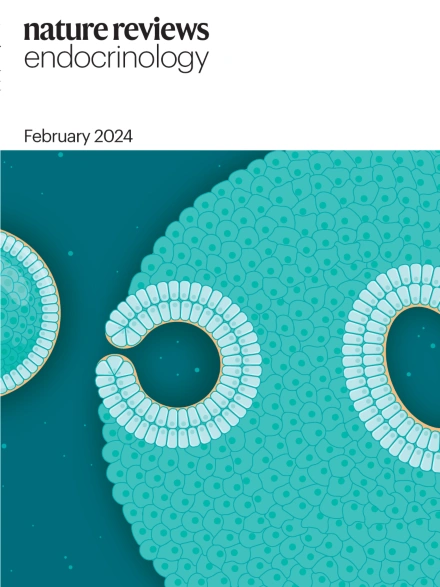The complexity of the relationship between thyroid disease and body weight.
IF 40
1区 医学
Q1 ENDOCRINOLOGY & METABOLISM
引用次数: 0
Abstract
The factors influencing the control of body weight are numerous and include many hormones. Even though levels of thyroid hormone might not always be the major factor affecting weight, in the sense that large changes in weight can occur despite a euthyroid state, there are notable changes in weight, appetite and body composition associated with excesses and deficiencies of thyroid hormone. Exploring the effect of thyroid hormone on weight is facilitated by studying the disease states of hypothyroidism and hyperthyroidism, the development and treatment of which can be associated with substantial changes in body weight. As is illustrated in the ensuing discussion, hypothyroidism is associated with modest increases in body weight and accompanying changes in body composition, with reversal of these alterations with its treatment. By contrast, hyperthyroidism can be accompanied by profound weight loss with reversal of the weight loss with restoration of euthyroidism. Using iatrogenic hyperthyroidism, whether during treatment for hypothyroidism or during off-label use in euthyroid individuals, has not proven to be an effective weight loss strategy.甲状腺疾病与体重关系的复杂性。
影响体重控制的因素很多,包括许多激素。尽管甲状腺激素水平可能并不总是影响体重的主要因素,从某种意义上说,即使甲状腺功能正常,体重也会发生巨大变化,但体重、食欲和身体成分的显著变化与甲状腺激素的过量和缺乏有关。探讨甲状腺激素对体重的影响可以通过研究甲状腺功能减退和甲状腺功能亢进的疾病状态来实现,而甲状腺功能减退和甲状腺功能亢进的发展和治疗与体重的实质性变化有关。正如在随后的讨论中所说明的,甲状腺功能减退与体重的适度增加和伴随的身体成分的变化有关,并且通过治疗可以逆转这些变化。相比之下,甲状腺功能亢进可伴有严重的体重减轻,体重减轻随着甲状腺功能恢复而逆转。使用医源性甲状腺功能亢进,无论是在治疗甲状腺功能减退或在标签外使用甲状腺功能正常的个体,尚未被证明是一种有效的减肥策略。
本文章由计算机程序翻译,如有差异,请以英文原文为准。
求助全文
约1分钟内获得全文
求助全文
来源期刊

Nature Reviews Endocrinology
医学-内分泌学与代谢
CiteScore
42.00
自引率
0.70%
发文量
158
审稿时长
6-12 weeks
期刊介绍:
Nature Reviews Endocrinology aspires to be the foremost platform for reviews and commentaries catering to the scientific communities it serves. The journal aims to publish articles characterized by authority, accessibility, and clarity, enhanced with easily understandable figures, tables, and other visual aids. The goal is to offer an unparalleled service to authors, referees, and readers, striving to maximize the usefulness and impact of each article. Nature Reviews Endocrinology publishes Research Highlights, Comments, News & Views, Reviews, Consensus Statements, and Perspectives relevant to researchers and clinicians in the fields of endocrinology and metabolism. Its broad scope ensures that the work it publishes reaches the widest possible audience.
 求助内容:
求助内容: 应助结果提醒方式:
应助结果提醒方式:


